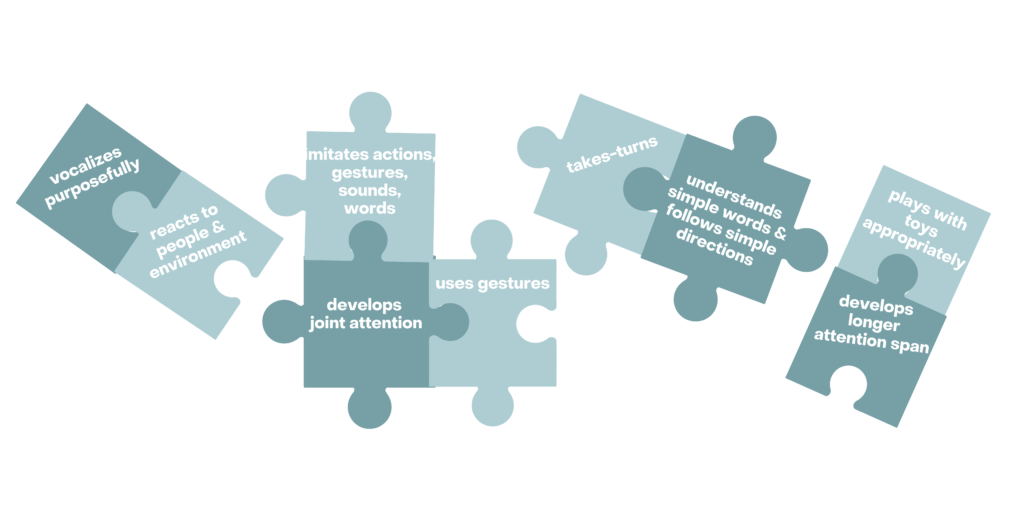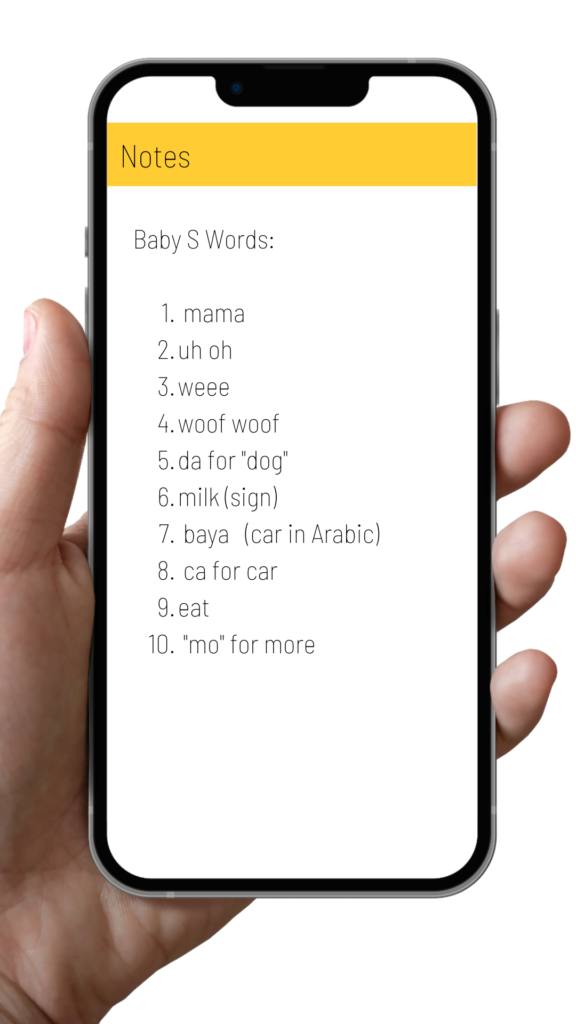One of the most frequently asked questions I hear from families is, “How many words should my child be saying??”
To be honest, sometimes this is tricky one to answer! Why? because there is so much more to a child’s communication skills than the number of words they use. Word count is only one piece of the communication puzzle. Before children learn to talk they have to build foundational pre-verbal/linguistic skills. You can see them listed below. Think of them as the mini milestones that lead to talking! More to come on this in a later post, but do know we never want to forget the bigger picture!

Milestone Vs. Average
Typically there are two sets of numbers shared when discussing expressive vocabulary expectations. These include the milestone and the average. The milestone is what 90% of children are able to do at a certain age and the average is what 50% of children are able to do at a certain age. The same is true for other areas of development, there is always a range in which milestones are typically met.
Below you can find expressive language milestones & averages:
Milestone
12 months: 1 words
15 months: 5 words
18 months: 10 words
24 months: 50 words
36 months: 250 words
Average
12 months: 2-6 words
18 months: 50 words
24 months: 200-300 words
36 months: 1000+ words
Know that there is a wide range of “normal” when it comes to how many words a child should say. However, your child’s expressive vocabulary should be falling somewhere between the milestone and the average. If it isn’t yet, know you have done nothing wrong. Some children need a little extra support in this area!
What counts as a word?
In order to for a word to ‘count’ a child must use the word consistently, independently, and intentionally in the right context. This tells us your child is trying to communicate purposefully!
Many parents are surprised to learn their child is saying more words than they originally thought when they learn what counts as a word!
- Animal sounds: woof woof, meow, rawr!
- Vehicle sounds: vroom, beep beep, choo choo!
- Exclamatory/Fun sounds: uh oh, weee, oh noo
- Word approximations: “ba” for “ball,” “wawa” for “water,” “uh,” for “up”
- Words in other languages, including sign language, and they can be approximations too!
My child says the same word for lots of things, does it still count?
Learning to talk is complex! Often times children will use word approximations to simplify words in ways that makes them easier to say. It is very normal for a child to use the same simplification for multiple words that begin with the same sound. So long as they are used consistently, independently, and intentionally, they count!
I’ll share a few examples:
- “ba” for ball —— “ba” for book
- “duh” for done —— “duh” for down
- “uh” for up —— “uh” open
- “ma” for more —— “ma” for mama
My child is bilingual, are the milestones the same?
Yes, the expectations are the same for bilingual children. The only difference is that you would add up the number of words in each language to calculate your child’s TOTAL vocabulary. When vocabulary in both languages are combined, they are typically as big or bigger than the vocabulary of monolingual children.
Total Vocabulary: # of words in 1st language + # of words in 2nd language = total vocabulary
How can I keep track of my child’s word count?
I love using the “notes” app on the iPhone! If you’re concerned about your child’s communication development or simply curious you can keep track of your child’s growing vocabulary! All you need to do is jot down the words they use consistently, independently, and intentionally :).
I generally recommend families to stop counting words if they no longer have concerns or if your child is adding many new words to their vocabulary it’s hard to keep up!

Remember there is so much more to your child’s language skills than the number of words they use. We should be looking at all pieces of the communication puzzle!
If you have concerns about your child’s speech & language development, know that support is always available. I encourage you to schedule a consultation with a speech-language pathologist or reach out to your local Early Intervention program, where services are usually low cost or free to families.
We’re here to help!
Leave a Reply Cancel reply
FREE GUIDE!
4 Things you won't find in your baby books
4 truths about your baby that no one's telling you